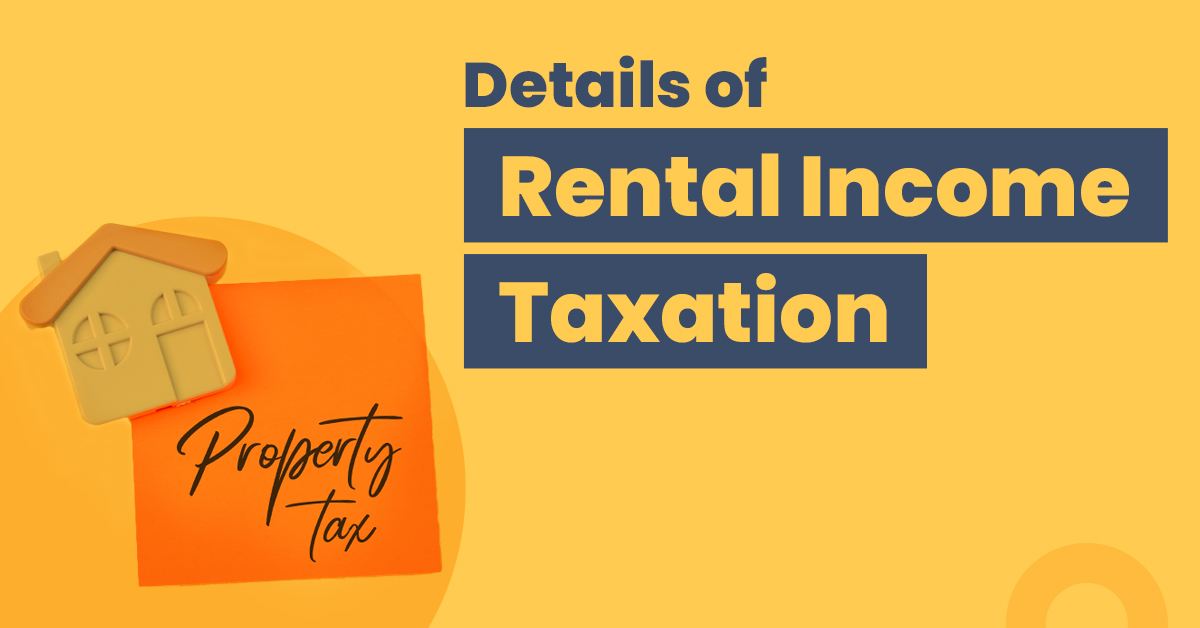Details of Rental Income Taxation in India (2022 – 2023)


In India, real estate is considered a lucrative investment option because it is an essential source of passive income. Rental income ensures financial security and enables a person to build a substantial retirement corpus. However, people need to know the taxation on rental income in India if they wish to earn passive income from the properties they own.
About Rental Income in India
Before learning about the taxation of rental income, let us first look at the different sources of income from an individual. As per the Income Tax Act (ITA), a person’s income can be categorised as follows:
- Income from salary
- Income from business profits or gains earned from one’s profession
- Income from house property
- Income from capital gains
- Income from other sources
Broadly, real estate investments are categorised into residential and commercial. Most people prefer residential investments as it offers a sustained flow of rental income and steady capital appreciation. However, increasing economic expansions have made the commercial real estate sector much more profitable investment as compared to residential rental yield.
Also Read: Consider these Points for the Advance Payment of Income Tax Instalment
Different Types of Rental Income
Now let us explore the different types of rental income:
- Income from house property
When a person earns rental income from buildings, apartments or land, it is referred to as ‘income from house property.‘ It also includes any advance payment made as a security deposit.
- Rental income from a partly self-occupied house property
If the owner partially occupies the property and partly lets it out for rent, its parts become independent units. Rental income from these units is considered under separate heads:
- Part of an owner’s property will be taxed as per taxation rules for income from a self-occupied property.
- The income gained from the portions put on rent will be taxed as ‘income from house property.’
- Rental income earned by tenants from sub-letting their portion will not be considered under ‘income from house property.’ Sub-letting means leasing a portion of a self-occupied property for a specific duration.
- It is challenging to differentiate between letting out a building and its assets (such as equipped theatres). The entire amount will be treated as ‘income from other sources or business profits.’
- Rental income from composite rent
In some cases, letting out a building could be separate from letting out its assets, for example, refrigerators and washing machines, along with the house. Then, the following rules will be applicable:
- Rental income from only the house will be treated as ‘income from house property.‘
- Rental income from other assets will be taxed under ‘income from other sources or ‘profits or gains made from businesses.’
- Rental income from a shop
Suppose a taxpayer has let out his/her land and building, and a shop has been situated there. The rental income that the owner earns falls under ‘income from house property.’
Also Read: Everything to Know about Taxes on Silver in India
Tax on Rental Income in India
As mentioned, rental income in India is mostly taxed as ‘income from house property.’ Any property owner receiving rent for a house, shop or factory is liable to pay taxes.
The tax on rental income is calculated on the annual rent value (measured in Gross Annual Value) received by the property owner. Taxpayers need to deduct municipal taxes, home loan EMIs and standard deductions to determine their tax liability on rental income.
Rental income from a property in India is taxable as per an individual’s tax slab rate. However, if the Gross Annual Value (GAV) is less than ₹ 2.5 lakh, zero tax would be applicable on rental income. Several deductions are available under the IT Act that reduces one’s rental tax liability.
According to Section 24A of the Income Tax Act, taxpayers can receive 30% of the standard deduction to deal with repairs and renovations. However, to avail this deduction under the Income Tax Act for rental income, people need to be legal owners of the property.
According to Section 24B of the Income Tax Act, if an individual lets out a property purchased with a home loan, the entire amount paid as loan interest on a particular financial year can be claimed as a deduction after the standard deductions.
Calculation of Tax on Rental Income
Given below are the steps to calculate the tax on rental income in India:
Step 1: Calculate the property’s Expected Rent. Generally, a property’s Expected Rent is higher than its fair rent, which is based on its municipal value. Reasonable Expected Rent should not exceed standard rent if the property falls under Rent Control Act.
Step 2: Calculate the property’s Actual Rent. Then, calculate its Gross Annual Value, which will be the higher amount of the reasonable Expected Rent and Actual Rent.
Step 3: Deduct the amount of municipal taxes to calculate the property’s Net Annual Value.
You can claim up to 30% deductions from this Net Annual Value (NAV). It is the standard deduction permissible by the IT Act.
Step 4: If you have availed of a housing loan to acquire the rented property, you can claim deductions for the amount paid as loan interest in a financial year. In the case of let-out properties, there is no upper limit that can be claimed as deductions. But the upper limit is capped at ₹2,00,000 or ₹30,000 for self-occupied properties as per different factors.
Step 5: The amount that remains is your taxable rental income. You need to pay taxes on this income according to your corresponding tax slab rate.
Let us illustrate this further with an example:
Suppose an apartment’s monthly rent is ₹ 35,000
Then, Gross Annual Value (GAV) = 12 months X 35,000 = 4,20,000
Property tax paid = ₹ 20,000
Net annual value = ₹ 4,20,000 – ₹ 20,000 = ₹ 4,00,000
Standard deduction = 30% of NAV = ₹ 1,20,000
Interest paid on home loan = ₹ 60,000
Taxable income = 4,20,000 – 1,20,000 – 60,000 = ₹ 2,40,000
In this case, GAV is less than ₹ 2.5 Lakh hence the rental income is not taxable.
Also Read: All You Need to Know About Income from Other Sources
Which Section of ITA Specifies Taxation Rules for House Property?
Section 22 of the Income Tax Act specifies rules for taxation from rental income in India. Listed below are the crucial conditions a property must fulfil:
- First, the individual must own the property.
- The property must be either a piece of land or a building attached to it.
- The owner must not use the property for his/her business or profession. This is because the owner’s profits fall under a separate category.
Which Properties Are Not Taxable in India?
There are specific properties that are entirely tax-free. So, taxpayers do not have to include the rental income from these properties for income tax calculation. Now, let us take a look at these properties:
- According to Section 22 of the Income Tax Act, people do not have to pay taxes for income from properties they use for business purposes. For example, suppose someone owns a property they use as their office space. In this case, they do not have to pay taxes for the space they use.
- As per Section 10 (1) of the IT Act, income generated from properties in or around agricultural lands is treated as rural income. For example, farmhouse owners do not have to pay taxes on rental income generated by the property. As per Section 10 (20) of ITA, property owners do not have to pay taxes when they let out their properties to local authorities.
- As per Section 10 (21) of ITA, people do not have to pay any tax if they let out or lease their properties to an approved science research association.
- Rental income from a certified trade union’s property is tax-exempt under Section 10 (24).
- As per Section 10 (23C), rental income from medical and educational institutions is exempt from taxes.
- According to Section 11 of ITA, rental income from charitable or religious institutions properties is tax-exempt.
- Rental incomes from properties that belong to political properties are entirely tax-exempt in India, as per Section 13A of ITA.
- The annual value of a property the owner uses as his/her residence does not fall under taxable income as per Section 23 (2) of ITA.
What Are the Ways to Save Taxes on Rental Income?
Below are some of the best ways to save taxes on rental income:
- Standard deduction
Property owners can decrease their taxable income with the 30% standard deduction on the property’s NAV for repairing and painting provisions. Add an example
- Unpaid rents
Gross annual value is taken into consideration for the calculation of tax on rental income. Therefore, property owners can claim deductions if they do not receive rent from their tenants in time. Moreover, if taxpayers face any unrealised loss of rent due to vacant properties, they can adjust it with their rental income while calculating the GAV.
- Tax benefits against home loans
If someone buys a property with a home loan and then rents out the property, he or she can claim tax deductions against the interest amount that they pay for the home loan. As per Section 24 (b) of the Income Tax Act, property owners can seek tax deductions up to ₹ 2 lakh against the interest amount paid for a home loan.
Additionally, if the taxpayer qualifies for availing tax benefits u/s 80EEA, he can claim a maximum benefit of ₹ 1.5 lakh. This amount is for the principal part of the home loan repayment. Therefore, if a person earns rental income, he can seek a total deduction of ₹ 3.5 lakh against both interest and principal repayment for a home loan.
- Tax benefits for property co-owners
Joint ownership of a property can reduce the tax liability on rental income, especially if the co-owners opt for a home loan to purchase the property. If the conveyance deed specifies each owner’s shares, they can claim tax benefits as per their ownership ratio.
Property co-owners can seek tax benefits under both Sections 24 and Section 80C. However, property owners must note that the total amount the co-owners claim as deductions should not exceed the interest and principal amount paid in that financial year.
Final Word
The real estate occupies a critical position in people’s psyches in India, partly because people equate it with prestige. Rental income is an important source of passive income, especially for retired people. Moreover, India’s real estate sector is witnessing a rise in the number of investors. If someone wishes to rent out their real estate properties, they will want to know everything about taxes on rental income in India.








